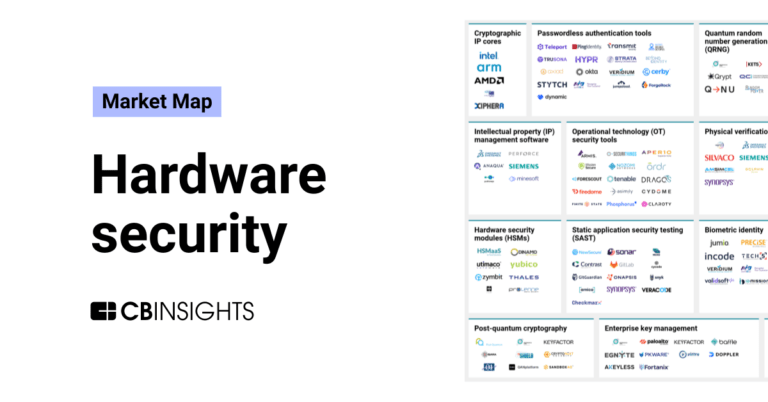
Stytch
Founded Year
2020Stage
Series B | AliveTotal Raised
$126MValuation
$0000Last Raised
$90M | 3 yrs agoMosaic Score The Mosaic Score is an algorithm that measures the overall financial health and market potential of private companies.
-180 points in the past 30 days
About Stytch
Stytch is a developer-focused identity platform that offers authentication, authorization, and fraud prevention services within the tech industry. The company provides a suite of tools, including APIs and SDKs, to enable secure and scalable identity management for various applications. Stytch caters to sectors such as SaaS, ecommerce, fintech, Web3, consumer tech, and healthcare. It was founded in 2020 and is based in San Francisco, California.
Loading...
Loading...
Research containing Stytch
Get data-driven expert analysis from the CB Insights Intelligence Unit.
CB Insights Intelligence Analysts have mentioned Stytch in 3 CB Insights research briefs, most recently on Feb 20, 2024.

Feb 20, 2024
The hardware security market map
Nov 3, 2023
The endpoint security market mapExpert Collections containing Stytch
Expert Collections are analyst-curated lists that highlight the companies you need to know in the most important technology spaces.
Stytch is included in 3 Expert Collections, including Unicorns- Billion Dollar Startups.
Unicorns- Billion Dollar Startups
1,257 items
Blockchain
11,233 items
Companies in this collection build, apply, and analyze blockchain and cryptocurrency technologies for business or consumer use cases. Categories include blockchain infrastructure and development, crypto & DeFi, Web3, NFTs, gaming, supply chain, enterprise blockchain, and more.
Cybersecurity
10,080 items
These companies protect organizations from digital threats.
Latest Stytch News
Dec 27, 2024
AI agents may lead the next wave of cyberattacks SHARE While artificial intelligence agents are expected to lead the next wave of AI innovation, they’ll also empower cyberattackers with a more potent set of tools to probe for an exploit vulnerabilities in enterprise defenses. That’s according to Reed McGinley-Stempel, chief executive officer of identity platform startup Stytch Inc. OpenAI LLC’s GPT-4 large language model, which debuted early this year, appears to be far more effective than its predecessors in identifying weaknesses in website security. “AI should improve cybersecurity if you use it for the right reasons, but we’re seeing it move much faster on the other end, with attackers realizing that they can use agentic AI means to gain an advantage,” he said. He pointed to a paper published in April by researchers at the University of Illinois Urbana-Champaign that found that GPT-4 can write complex malicious scripts to find vulnerabilities in Mitre Corp.’s list of Common Vulnerabilities and Exposures with an 87% success rate. A comparable experiment using GPT-3.5 had a success rate of 0%. The paper said GPT-4 was able to follow up to 50 steps at one time in its probe for weaknesses. That raises the specter of armies of AI agents pounding on firewalls constantly looking for cracks. “GPT-4 now can effectively be an automated penetration tester for hackers,” McGinley-Stempel said. “You could easily start to see agentic actions being chained together, with one agent recognizing the vulnerabilities and another focused on exploitation.” Defenders overmatched That kind of constant penetration testing is beyond the scope of most cybersecurity organizations to combat, he said. “Many organizations run a pen test on maybe an annual basis, but a lot of things change within an application or website in a year,” he said. “Traditional cybersecurity organizations within companies have not been built for constant self-penetration testing.” Stytch is attempting to improve upon what McGinley-Stempel said are weaknesses in popular authentication schemes of such as the Completely Automated Public Turing test to tell Computers and Humans Apart, or captcha, a type of challenge-response test used to determine whether a user interacting with a system is a human or an bot. Captcha codes may require users to decipher scrambled letters or count the number of traffic lights in an image. Stytch’s technology creates a unique, persistent fingerprint for every visitor. It claims its software can detect automated visitors such as bots and headless browsers with 99.99% accuracy without requiring user interaction. A headless browser is a browser without a graphical user interface that is used primarily to speed up automated tasks such as testing but can also be exploited to confuse authentication systems about whether the visitor is a human or a machine. A recent increase in the percentage of headless browser automation traffic Stytch has detected on customer websites is one indication that bad actors are already using generative AI to automate attacks. Since the release of GPT-4, the volume of website traffic coming from headless browsers has nearly tripled from 3% to 8%, McGinley-Stempel said. AI will further diminish the value of captchas, he said. A combination of generative AI vision and headless browsers can defeat schemes that require visitors to identify objects and images, a popular use case. Even sophisticated automation detection technology can be foiled by services like Acaptcha Development LP’s Anti-Captcha , which farms out captcha solutions to human workers. “Putting someone in front of a captcha raises the cost of attack but isn’t necessarily a true test,” he said. AI arms race Ultimately, the use of AI and models to solve cybersecurity challenges will be mostly ineffective, he said. “If you’re just going to fight machine learning models on the attacking side with ML models on the defensive side, you’re going to get into some bad probabilistic situations that are not going to necessarily be effective,” he said. Probabilistic security provides protections based on probabilities but assumes that absolute security can’t be guaranteed. Stytch is working on deterministic approaches such as fingerprinting, which gathers detailed information about a device or software based on known characteristics and can provide a higher level of certainty that the user is who they say they are. The most effective preventions enterprises can employ with current technology is a combination of distributed denial of service attack prevention, fingerprinting, multifactor authentication and observability. The last technique is often overlooked, he said. “If you embedded our device fingerprinting JavaScript snippet on your website, you’d get a lot of interesting data on what percentage of your traffic was bots, headless browsers and real humans within an hour,”’ he said. Information technology executives are often alarmed to discover what Imperva Inc. reported earlier this year: Almost half of internet traffic now comes from nonhuman sources.
Stytch Frequently Asked Questions (FAQ)
When was Stytch founded?
Stytch was founded in 2020.
Where is Stytch's headquarters?
Stytch's headquarters is located at 111 Chestnut Street, San Francisco.
What is Stytch's latest funding round?
Stytch's latest funding round is Series B.
How much did Stytch raise?
Stytch raised a total of $126M.
Who are the investors of Stytch?
Investors of Stytch include Index Ventures, Benchmark, Coatue, Thrive Capital, Dylan Field and 8 more.
Who are Stytch's competitors?
Competitors of Stytch include Wink and 7 more.
Loading...
Compare Stytch to Competitors
OwnID is a company that focuses on digital identity verification in the technology sector. It offers a service that allows individuals to create a digital identity that can be used to log in to websites and apps, eliminating the need for usernames and passwords. The company primarily serves the ecommerce industry, providing a frictionless login and registration experience for users. It was founded in 2021 and is based in Tel Aviv, Israel.

ForgeRock specializes in digital identity and operates in the identity and access management (IAM) sector. The company offers comprehensive IAM solutions for consumers, employees, and things, enabling secure and straightforward access to the connected world. Its solutions orchestrate, manage, and secure the complete lifecycle of identities, including dynamic access controls, governance, and application programming interface integration, suitable for any cloud or hybrid environment. It was founded in 2010 and is based in San Francisco, California.

Ping Identity specializes in identity security for the digital enterprise within the cybersecurity industry. The company offers a range of services, including management of customer and workforce identities, decentralized identity services, and solutions for passwordless authentication, zero trust implementation, and cloud migration. Ping Identity primarily serves sectors such as government, financial services, healthcare, retail, and media and telecommunications. It was founded in 2002 and is based in Denver, Colorado.

1Kosmos focuses on blockchain-powered identity and authentication in the technology sector. The company offers services such as identity verification, passwordless authentication, and document verification, all aimed at enhancing security for employees, customers, and citizens. It primarily serves sectors such as financial services, government, healthcare, insurance, and manufacturing. It was founded in 2018 and is based in Somerset, New Jersey.
Trusona is a cybersecurity company focused on account takeover protection and identity verification solutions. The company offers services that aim to prevent unauthorized access and secure transactions for IT helpdesks and other business operations. Trusona's solutions address various cyber threats including man-in-the-middle attacks, SIM swaps, and GenAI deepfake social engineering. It was founded in 2015 and is based in Scottsdale, Arizona.

Nok Nok Labs provides passwordless authentication solutions within the cybersecurity industry. The company has FIDO-certified products that facilitate user authentication and payment processing, as well as compliance services for digital services. Nok Nok Labs serves sectors such as government, e-commerce, financial services, and mobile network operators. It was founded in 2012 and is based in Palo Alto, California.
Loading...
